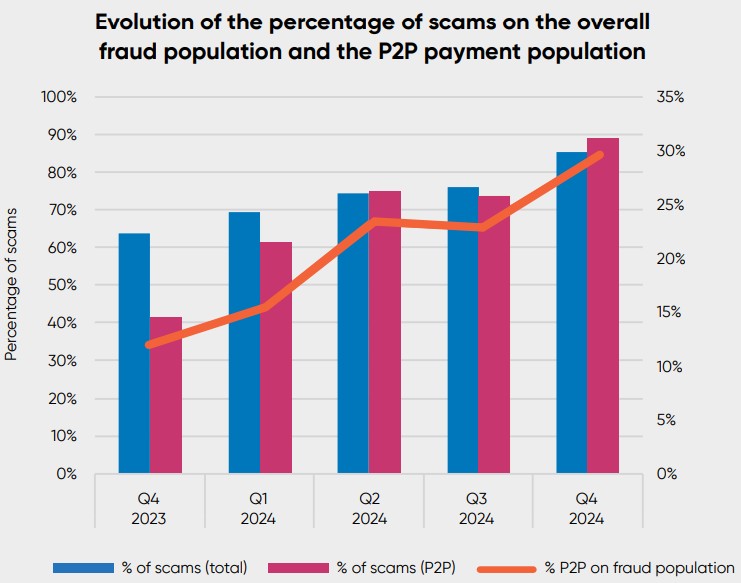Germany is grappling with an escalating wave of
digital banking fraud, driven by a surge in phishing attacks, investment scams,
and emerging tactics like QR code phishing.
Unlike other European nations, where fraud trends are
shifting, phishing remains Germany’s primary threat, with cases rising 4.8% in
the past year, according to research by BioCatch.
With the EU‘s Instant Payments Regulation (IPR) now in
effect, fraud risks could intensify as criminals exploit faster transactions to
deceive consumers and financial institutions.
Phishing, Social Engineering, and a Trust Deficit
Phishing scams continue to dominate Germany’s fraud
landscape, leading to financial losses and diminishing trust in online banking.
According to the research, Germans have collectively lost €267 billion to
phishing attacks, with 69% of incidents occurring through digital channels.
This has made consumers increasingly wary of online
transactions, with 32% viewing AI as a threat rather than an opportunity. Unlike other European countries where banks often
cover losses, German victims must prove they were not negligent, making it
harder to reclaim stolen funds.

Additionally, the rise of QR code phishing, or
“quishing,” has further complicated the landscape. Fraudsters have
reportedly been placing fake QR codes on parking meters, EV charging stations,
and even bank notifications to steal user credentials and inject malware into
unsuspecting victims’ devices.
A staggering 43% of social media users in Germany have
invested in digital assets, often relying on influencers rather than
professional advisors. Despite their confidence, younger investors are highly
vulnerable. While 55% of Gen Z and Millennials believe they won’t be scammed,
they now account for 72% of all scam victims.
However, financial losses remain higher among older
generations, with Baby Boomers losing an average of €18,000 per scam compared
to just €400 for Gen Z victims.
Improved Transaction Speeds and Fraud
The EU’s Payment Services Directive 3 (PSD3) and the
Instant Payments Regulation (IPR) have introduced significant changes to
banking security. Under IPR, payment service providers must process and confirm
euro-denominated instant payments within 10 seconds.
PSD3 aims to strengthen consumer protections by
enhancing Strong Customer Authentication (SCA) requirements, improving Open
Banking oversight, and enforcing stricter compliance for financial
institutions.
However, lessons from early adopters like the UK
suggest that such measures may be more effective in preventing errors than
stopping fraud. Criminals are already adapting, using social
engineering tactics to manipulate victims into authorizing transactions.
Germany is grappling with an escalating wave of
digital banking fraud, driven by a surge in phishing attacks, investment scams,
and emerging tactics like QR code phishing.
Unlike other European nations, where fraud trends are
shifting, phishing remains Germany’s primary threat, with cases rising 4.8% in
the past year, according to research by BioCatch.
With the EU‘s Instant Payments Regulation (IPR) now in
effect, fraud risks could intensify as criminals exploit faster transactions to
deceive consumers and financial institutions.
Phishing, Social Engineering, and a Trust Deficit
Phishing scams continue to dominate Germany’s fraud
landscape, leading to financial losses and diminishing trust in online banking.
According to the research, Germans have collectively lost €267 billion to
phishing attacks, with 69% of incidents occurring through digital channels.
This has made consumers increasingly wary of online
transactions, with 32% viewing AI as a threat rather than an opportunity. Unlike other European countries where banks often
cover losses, German victims must prove they were not negligent, making it
harder to reclaim stolen funds.

Additionally, the rise of QR code phishing, or
“quishing,” has further complicated the landscape. Fraudsters have
reportedly been placing fake QR codes on parking meters, EV charging stations,
and even bank notifications to steal user credentials and inject malware into
unsuspecting victims’ devices.
A staggering 43% of social media users in Germany have
invested in digital assets, often relying on influencers rather than
professional advisors. Despite their confidence, younger investors are highly
vulnerable. While 55% of Gen Z and Millennials believe they won’t be scammed,
they now account for 72% of all scam victims.
However, financial losses remain higher among older
generations, with Baby Boomers losing an average of €18,000 per scam compared
to just €400 for Gen Z victims.
Improved Transaction Speeds and Fraud
The EU’s Payment Services Directive 3 (PSD3) and the
Instant Payments Regulation (IPR) have introduced significant changes to
banking security. Under IPR, payment service providers must process and confirm
euro-denominated instant payments within 10 seconds.
PSD3 aims to strengthen consumer protections by
enhancing Strong Customer Authentication (SCA) requirements, improving Open
Banking oversight, and enforcing stricter compliance for financial
institutions.
However, lessons from early adopters like the UK
suggest that such measures may be more effective in preventing errors than
stopping fraud. Criminals are already adapting, using social
engineering tactics to manipulate victims into authorizing transactions.
This post is originally published on FINANCEMAGNATES.

